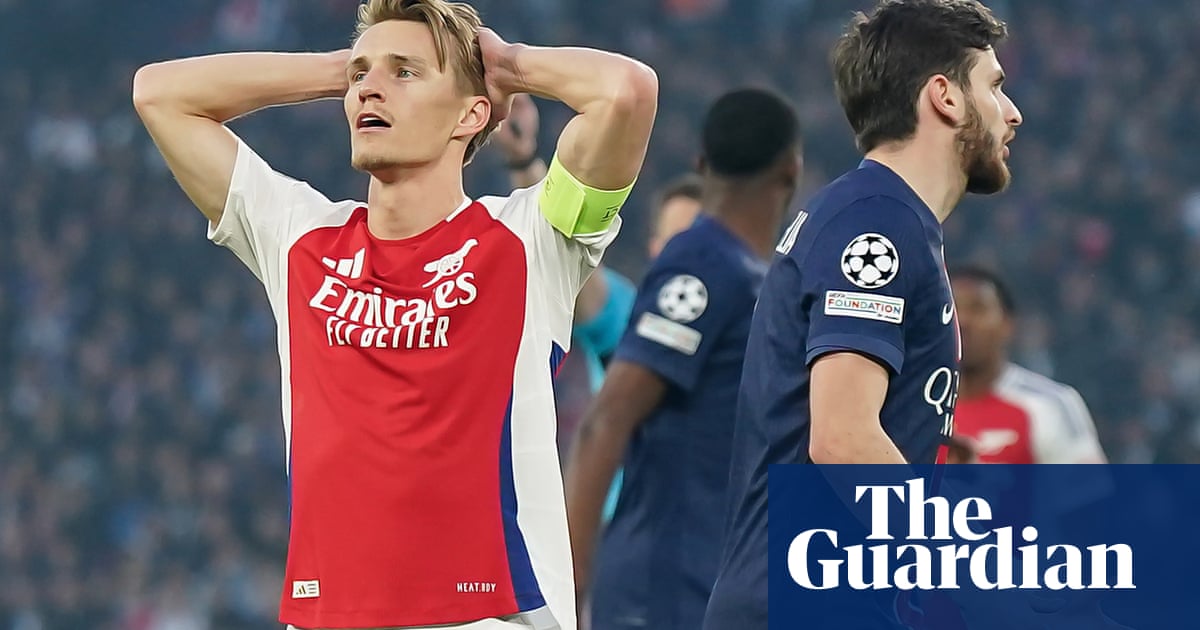How to lose a game of football part 94: losing while appearing to win, advanced level. It will be tempting to see in the opening 27 minutes of thisChampions Leaguesemi-final second leg a perfect little miniature, an executive summary of a team and a mini-era, out there under the hard white lights of the Parc des Princes, Mikel Arteta’s Arsenal pinned and wriggling on the wall.
The club’s supporters will feel the pain more keenly because for the first 26 of those 27 minutes this was a slick, luminous, dominantArsenalaway performance. They flooded the midfield, controlled the ball, won it back aggressively. Martin Ødegaard squirrelled about, all malevolent invention. Arsenal had 75% possession, six shots and 10 crosses. They were all over this game, arms on both lapels, pressing PSG back against the edge of things.
To all intents and purposes they were winning this game. Except of course for that familiar feeling of something starting to clarify at the edge, that figure just out of sight, the shape behind the curtains. Enjoy these moments. Believe for a while if you can. Because behind it all that figure in the shadows is getting a little closer all the time.
The Parc des Princes is a huge, jagged concrete bowl, rising up out of the pavement by the ring road like the skeleton of a giant alien armadillo. It booms and bangs and generates its own static field on nights like these. Tongues of fire leapt at pitchside before kick-off, smoke fogged the pitch, waves of noise crackled around its steeply tiered sides.
But Arsenal’s players marched straight into this game, taking the ball away from the start. They really should have scored with three minutes gone, Jurrien Timber cutting a cross back for Declan Rice to head wide. They should have scored two minutes later from a Thomas Partey long throw, Gianluigi Donnarumma saving at close range.
Arsenal’s full-backs were doing interesting things, tucking in at the same time, Myles Lewis-Skelly taking chances on the ball. Crosses kept fizzing through the six-yard box pointedly. They really needed to score, to make this real. The ball came back to Ødegaard at the edge of box. Donnarumma produced a wonderful one-handed save. David Raya went haring off and ferried fresh instructions on. Presumably those instructions were: you really need to score here.
Still the pressure kept coming, more aerial stuff, first contact, second ball, shots at goal that weren’t quite shots at goal, and through it all that shape beginning to clarify a little more in the shadows, waiting patiently, flexing its scythe.
By now Arteta was up on his touchline in black car coat and black lace-ups, collar up, like a police sniper on night manoeuvres. The French press have been a little dismissive of Arsenal’s manager this week, one newspaper referring to his “overly emotional register”. And yes, there is a degree of sloganeering, an insistence on intensity and energy, a feeling of being lectured by a male wellness magnate.
But Arteta doesn’t have a Dembélé. He doesn’t even have a Gabriel Jesus. He has a well-grooved machine with no blade and no edge; all cake – no icing. And there was something tender and slightly bruised about seeing him out there under the immaculately groomed helmet of hair , his combinations firing, patterns set, but feeling it too, that figure approaching at the edge of things, the night falling away.
Paris had been bright, crisp and grudgingly spring-like all afternoon, the away support massed close to the Tour Eiffel for the day-trip optics. Everyone knew what Arsenal had to do here. Start well. Make PSG sweat. They did all of this. But in those 26 minutes there was also a kind of unravelling. And on 27 minutes PSG provided the perfect coda, Fabián Ruiz scoring a brilliant goal to make it 2-0 on aggregate.
Sign up toFootball Daily
Kick off your evenings with the Guardian's take on the world of football
after newsletter promotion
It came from a corner headed clear. The touch by Ruiz to take the ball to his left was perfect, the shot exhilarating, a roundhouse cut viciously off the top of his foot, curling back inside the post in a righteous parabola, not an attempt or an effort, but a very deliberate insistence that this is just going to be it, the thing you’ve been trying to do for the opening quarter of this game.
And that was pretty much that, Arsenal’s ultimate defeat, 2-1 on the night, finally out there in the light, and looking the way you kind of knew it would all along. There was of course another shadow presence in those opening 26 minutes, the ghost player, the killer Arsenal never signed, the goalscorer to cash in all the fine work in every other part of this team.
In the end the failure to turn all the other fine minutes of the last three years into pots and glory isn’t a mystery or a psychological condition. It’s a personnel issue. It’s bravery in the market, a willingness to gamble in pursuit of victory, to rope in the kind of pure attacking talent that is measured out in tens of millions.
Arsenal have passed one test in getting this far. The real measure of the will to make this real will come in the summer and beyond. Watch it back, trace a line around those figures in the shadows. It’s all there in the teasing, empty excellence of those opening 26 minutes, and a defeat that never really looked like it had the tools to become a victory.
